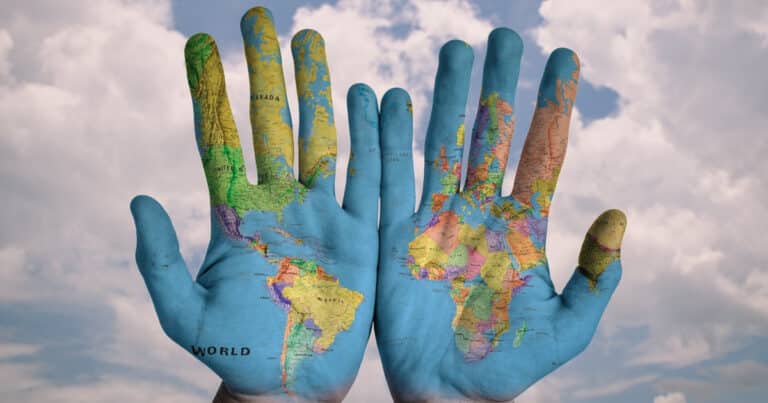By Matthew Mausner and Yonatan Neril – Our world has become much “smaller” and more interconnected in just the last generation. The rise and acceleration of globalization has ushered in vast increases in global migration, trade and communication—including negative effects on our environment and cultures. To put this broad topic in context, we will consider some of the pros and cons of globalization, as well as perspectives about human rights, values, and interfaith sustainability that may help you decide for yourself how you feel about globalization.
A Brief History of Globalization
Since the Cold War ended in 1991, the world has become intertwined in terms of shared commerce, international shipping and airplane travel, and a worldwide communication web, together called “globalization.”
This is qualitatively different from previous eras when the world also “shrank” in significant ways, like the 1500s when different countries in Europe spread a lifestyle, religion, conquest and diseases to the Americas, and American foods, tobacco, gold and silver were transported from the Americas to Europeans, Asians, and Africans.
Since 1980, global trade increased tenfold to about $20 trillion per year, yet in comparison the world population has less than doubled.
Today, the immediacy and enormity of the internet, the scale of giant cargo ships—many loaded with 20,000 large containers—carrying factory goods from China to Europe and the US—and many other factors make us more aware than ever of our interconnectedness on one small shared planet.
Pros and Cons of Globalization
Some of the ‘pros’ are so good that we perhaps take them for granted.
For example, since 1991, a tremendous increase in economic growth has raised material standards of living for the world’s poor. With the spread of information, goods and services, billions of people moved from Third World poverty into the world middle class, in places like China, India, and much of South America and sub-Saharan Africa. Some of the world’s worst diseases are now near eradication.
Clean water, basic infrastructure and sanitation are available to a majority of people in the world. Education, literacy and health care have spread. Trade and travel to almost every corner of the earth is safer. Due to expanded international trade, the foods people eat have become much more diverse.
What are the detriments of globalization?
We have seen free trade lead to unfair trade agreements, that let corporations from developed countries exploit resources in poorer regions without regard to local environmental impact. These multinational corporations promote materialism and ever-increasing demand.
Based on “economies of scale,” many products a country buys end up being created in other countries, at a cheaper cost than domestically produced goods. But the cost of “cheaper” production may ignore things like the dignity of workers and the depletion of natural resources in the producing countries.
Cultural diversity and biodiversity are both being swamped by our global civilization. At least 43% of the estimated 6,000 languages spoken in the world are endangered, according to UNESCO.
The variety of life on earth is suffering perhaps irreparably, especially in the shrinking tropical forests and acidifying coral reefs that contain the lion’s share of the different species on earth.
Human pollution in all of its impacts, including plastic in the oceans, carbon in the atmosphere, toxic chemicals in the soils, and even nuclear waste, may render our ecosystems inhospitable to life as we know it far more quickly than we understand.
These disadvantages of globalization just might be overtaking the pros, and if the benefits of globalization are not sustainable, they will disappear, leaving only the negative impacts.
Without globalization, do nature and human society look different?
One can argue that the pros of globalization still outweigh the cons. A vivid example of the contradiction: next to North Korea, one of earth’s most isolated, nonglobalized societies, is one of the most vibrant and biodiverse ecological preserves on earth.
The Demilitarized Zone (DMZ) border with South Korea, a “frozen” relic of the Korean War 70 years ago, has become a green oasis, a stopping point for countless bird migrations, and one of the few places on the planet that humans mostly leave untouched.
Yet the context for that preservation has been North Korea cutting itself off from the world, creating a deeply impoverished society with frequent famines and starvation.
Can globalization bring more good than bad?
There are some arguments that global prosperity itself is the engine to bring more good than bad. Many of the worst environmental impacts, from strip mining to overfishing, result from people making economic decisions driven by scarcity, desperation, or ruthless profit-seeking.
When people are less pressed by survival needs to make the most extreme short-term decisions—and when they and their enterprises are more intertwined in a global system that incentivizes not just economic growth but sustainability—globalization makes our long term survival more feasible.
Natural Capitalism and Globalization
A globalization driven by what Pawl Hawken, Amory Lovins and Hunter Lovins called ‘Natural Capitalism‘ will relate differently to nature than the global economy led by multinational corporations that has taken place in the past 30 years.
Natural Capitalism critiques “Industrial Capitalism”, saying that the traditional system of capitalism does not “value or appreciate ‘natural capital’– the natural resources and living systems, as well as the social and cultural systems that are the basis of human capital.”
By not valuing them, industrial capitalism extracts and degrades them.
Isn’t globalization unstoppable?
Whether we say globalization is a net positive or negative, the question is no longer whether globalization will continue, but how.
Larger developing economies like China’s have shifted from protectionist to embracing free trade. China has also invested hundreds of billions of dollars in other countries as part of its Belt and Road Initiative. In 2020, for the first time, the majority of Chinese energy investment in this Initiative went to renewable energy projects.
Can trade and investment be inspired, guided, and led in environmentally sustainable directions? Will holistic and faith-based values have enough influence, to ensure we hold to a path of healthy and livable sustainability, instead of destruction?
Faith Wisdom and Globalization
In the book Spiritual Perspectives on Globalization, Ira Rifkin writes, “On an individual level, globalization is about the promotion of consumer values that feed on the perception that happiness is rooted in material progress, that choice equals the highest freedom, and that being well connected is more important than being deeply connected.”
Religious traditions hold and have potential to offer profound wisdom to make globalization more ecologically sustainable. Some clergy, like Rabbi Micha Odenheimer, have written faith-based perspectives on globalization based on his work in countries like Burundi and Nepal.
Most clergy do not yet teach and preach about sustainability, or receive training on how to do so as part of their religious training. To actively help steer us onto a more sustainable path, people of faith can ask their clergy to engage in teaching on how a globalized humanity can live sustainably.
Since 2010, The Interfaith Center for Sustainable Development (ICSD) has organized over twelve conferences on religion and ecology, specifically engaging clergy and the institutions that train emerging clergy. ICSD’s Faith Inspired Renewable Energy Project works in Africa to deploy commercial-scale solar fields on church lands.
While the overwhelming majority (86%) of the world’s people identify to some degree as religious, the values of religion have not yet been sufficiently integrated into our rapidly changing patterns of technology and international trade. Therefore religion is one of our biggest untapped resources for positive change.
* Featured image source






